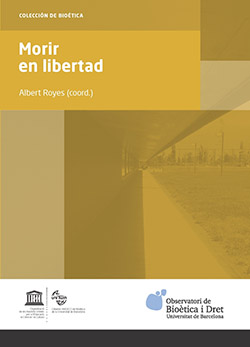The Bioethics and Law Obs.
Master in Bioethics and Law
UNESCO Chair in Bioethics
Contact
- Bioethics and Law Observatory
- UNESCO Chair in Bioethics
- University of Barcelona
- Faculty of Law
- Ave. Diagonal, 684
- 08034 Barcelona
- (+34) 93 403 45 46
- obd.ub@ub.edu
- Master in Bioethics and Law
- (+34) 93 403 45 46
- master.bd@ub.edu
The book ‘Morir en libertad’ creates debate on euthanasia
 Morir en libertad by Albert Royes is the new title in the Bioethics collection of the University of Barcelona (UB). In Morir en libertad (UB Editions and Publications, 2015), several experts reflect on the —always polemic— topic of a mercy killing, and they give reasons in favour of the legalization of euthanasia and the assisted suicide. They introduce them as fundamental rights which should be given by the Government to the people who agree with this action, like most of our neighbouring countries do.
Morir en libertad by Albert Royes is the new title in the Bioethics collection of the University of Barcelona (UB). In Morir en libertad (UB Editions and Publications, 2015), several experts reflect on the —always polemic— topic of a mercy killing, and they give reasons in favour of the legalization of euthanasia and the assisted suicide. They introduce them as fundamental rights which should be given by the Government to the people who agree with this action, like most of our neighbouring countries do.
It is divided in two parts. In the first part, the reader will find texts published by the Bioethics and Law Observatory (OBD) of the UB, covering information on this topic from 1994 to now. In the second part, there are texts by EXIT-ADMD Suisse Romande, an organization that gives assistance to suicide in Switzerland, a country where this practise is perfectly legal and supervised by health professionals. By placing this information in the second part of the book as a necessary complement for the first part of the book, it aims to promote the mechanism and resolutions of these entities, as well as the importance of their tasks. In one of the texts it is said that by knowing euthanasia is a valid option, patients are already more mentally relieved.
The book also exposes why this is such a polemic topic in terms of ethics and politics, because the acceptance of a mercy killing needs legal and health guarantees as well as opening a social debate to establish the changes to be done and promoted.
There are many unanswered questions, regarding both the social consequences and its ―sometimes dramatic― effects on people. These are questions like Albert Royes': "If these people have the same freedom and capacity requirements to make decisions as the ones asked to the people who want to the euthanasia, why are them excluded from this option when the essentials are each own's dignity and the suffering pain that will accompany them if they continue living?"
This book belongs to the Bioethics Collection, which promotes a flexible and secular bioethics idea, within the respect and human rights framework, and it promotes the debate on ethic theories related to medicine, health sciences and the technologies applied to humans.
This is a collection launched by the Bioethics and Law Observatory of the University of Barcelona, directed by María Casado, tenured of the Unesco Chair in Bioethics of the UB, teacher of Philosophy of Law in UB, and director and founder of the Master in Bioethics and Law at UB. The books published in this Bioethics Collection are: La confidencialitat en l’assistència sanitària. Del secret mèdic a la història clínica compartida a Catalunya, by Lídia Buisan; Gestación por sustitución. Ni maternidad subrogada ni alquiler de vientres, by Eleonora Lamm; ADN forense: problemas éticos y jurídicos, by María Casado and Margarita Guillén (coords.); La Declaración Universal sobre Bioética y Derechos Humanos de la Unesco y la discapacidad, by María Casado and Antoni Vilà; Desapariciones forzadas de niños en Europa y Latinoamérica. Del convenio de la ONU a las búsquedas a través del ADN, by María Casado and Juan José López Ortega, and Morir en libertad, by Albert Royes (coord.).



